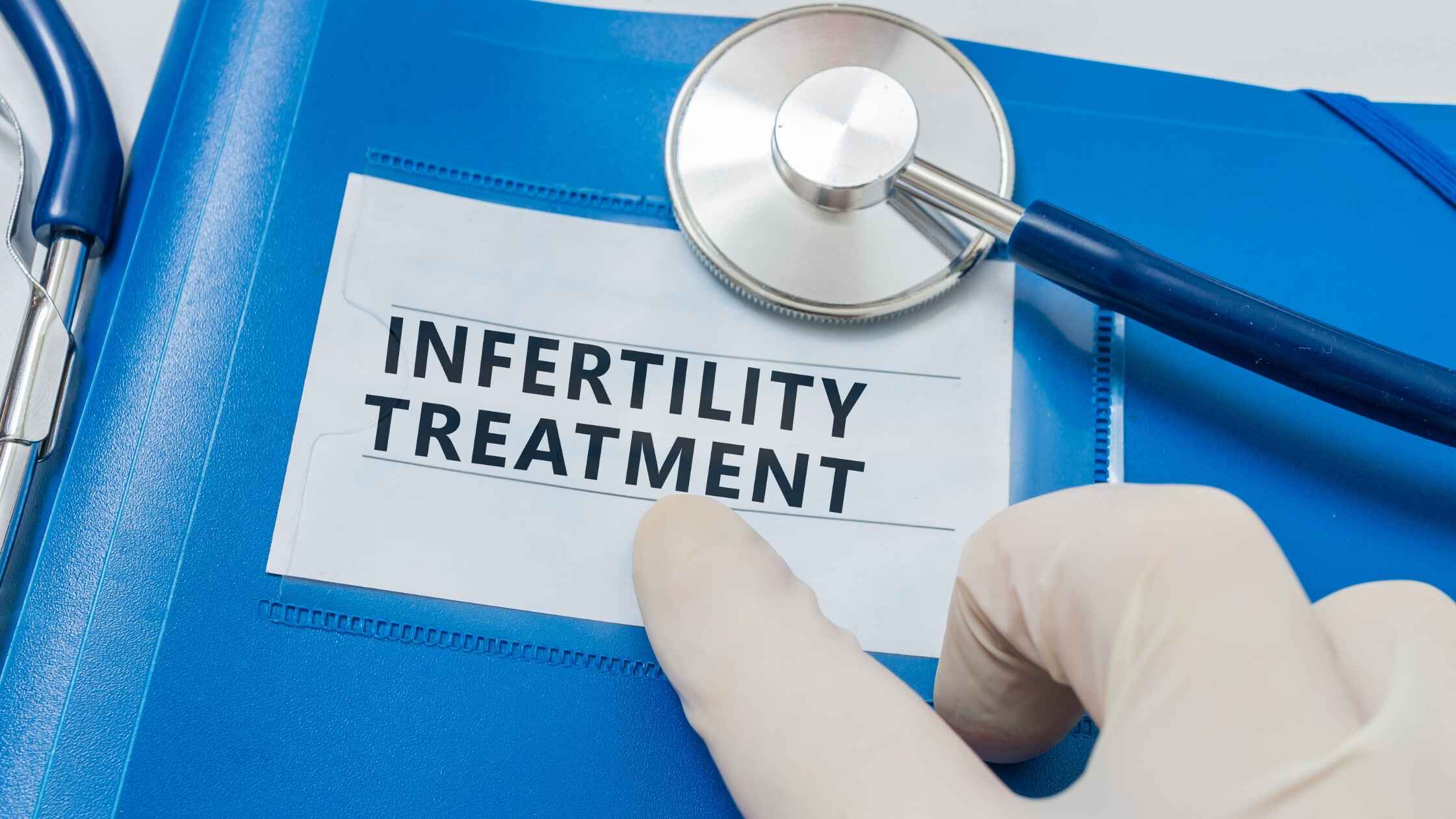Infertility is the inability to conceive after one year or more of trying.
This condition affects many women and can be due to various factors, including hormonal imbalances, polycystic ovary syndrome (PCOS), age, or structural issues with the uterus or fallopian tubes.
A menstrual cycle that is too long (over 35 days), too short (less than 21 days), irregular, or absent suggests that ovulation isn’t occurring, which is a common cause of infertility.
Treatment Options for Female Infertility
Infertility can be a challenging issue for many women, but there are several treatment options available that offer hope and solutions for those struggling to conceive.
Here’s an overview of the strategies used to address female infertility:
Ovulation Induction
Ovulation induction is a common first step in treating infertility, especially for women who have irregular menstrual cycles or do not ovulate regularly.
This method uses medication to stimulate the ovaries to produce more eggs, increasing the chances of conception. [Source]
Common medications for this treatment include Clomiphene Citrate, which works by blocking estrogen receptors, and FSH injections, which stimulate the development of multiple eggs.
Human Chorionic Gonadotropin (hCG) may also be used to help with the final maturation of eggs and trigger ovulation. [Source]
Intrauterine Insemination (IUI)
Intrauterine Insemination (IUI) is a procedure where millions of healthy sperm are placed directly into the uterus around the time the ovary releases one or more eggs to be fertilized. [Source]
This technique is particularly beneficial in cases where there are minor issues with sperm quality or mobility.
The process involves inserting sperm into the womb via a thin plastic tube passed through the cervix. [Source]
In Vitro Fertilization (IVF)
In Vitro Fertilization (IVF) is a more advanced form of assisted reproductive technology.
It involves extracting eggs and retrieving a sperm sample, then manually combining an egg and sperm in a laboratory dish.
The embryo(s) is then transferred to the uterus.
IVF is often recommended when other methods have failed or in cases of blocked fallopian tubes or severe male infertility. [Source]
Surgical Interventions
Surgery may be necessary to correct physical issues that affect fertility, such as blocked fallopian tubes, fibroids, or endometrial tissue.
Procedures like laparoscopy can often address these issues with minimal invasion and recovery time.
Surgery to remove patches of endometriosis has been found to double the chances of pregnancy, and it can also be used to repair the tubes or remove blockages. [Source]
Each treatment option has its considerations and is suitable depending on individual circumstances, such as the underlying cause of infertility, the woman’s age, her history of previous pregnancies, how long she has had infertility issues, and the presence or absence of male factor infertility.
It’s important to note that while these treatments offer hope, they also come with their own set of risks and there’s no guarantee of success.
Some individuals may also consider private treatment, which can be expensive. [Source]
Integrating Yoga and Holistic Lifestyle Changes for Fertility
When addressing infertility, combining medical treatments with holistic practices like yoga and lifestyle adjustments can be beneficial.
These integrative approaches not only support the body’s optimal functioning but also potentially improve the efficacy of medical treatments for infertility:
Yoga and Physical Health

Yoga is known for its physical benefits, which can be particularly helpful in managing infertility.
Specific asanas, or poses, such as Badrasana (Butterfly Pose), Matsyasana (Fish Pose), and Paryankasana (Couch Pose), are designed to strengthen the pelvic muscles and improve circulation in the pelvic region.
This can be particularly beneficial for reproductive health. [Source]
Inversion poses, such as Halasana (Plow Pose) and Viparita Karani (Legs-up-the-Wall Pose), are also recommended as they increase blood flow to the pelvic area, which helps nourish the reproductive organs.
Pranayama, or breathing techniques like Anulom Vilom (Alternate Nostril Breathing), help regulate hormone levels by reducing stress and enhancing body balance. [Source]
Nutritional Considerations

Diet plays a significant role in fertility. A balanced diet rich in fruits, vegetables, whole grains, and lean proteins supports hormonal balance and reproductive health.
Foods high in omega-3 fatty acids, such as flaxseeds and walnuts, are particularly beneficial for hormone production. [Source]
Conversely, it’s advised to limit the intake of processed foods and those high in sugars and unhealthy fats, as they can adversely affect hormone levels. [Source]
Mental Well-being

The mental aspect of fertility cannot be overlooked. Regular practice of meditation and mindfulness can significantly reduce stress, which is linked to decreased chances of conception.
Maintaining a hopeful and positive outlook is also essential as it can positively affect physical health and improve fertility outcomes. [Source]
Lifestyle Modifications
Regular Exercise: Moderate exercise can help maintain a healthy weight and regulate hormones.
Adequate Sleep: Ensuring enough rest is essential for hormone regulation and overall health.
These integrative approaches not only support the body in functioning at its best but also improve the efficacy of medical treatments for infertility.
Emotional Well-being and Stress Management During Fertility Treatments

The journey through fertility treatments can be emotionally taxing.
Managing stress and nurturing emotional well-being are crucial components that can significantly impact the path to conception.
Here are some strategies to support emotional health during this challenging time:
Emotional Support and Communication
Open Dialogue: Regular communication with your partner is essential for sharing feelings and stressors during infertility treatments.
Both parties need to express their emotions and support each other, which can strengthen the relationship and provide mutual comfort. [Source]
Support Groups: Joining a support group offers a sense of community and understanding from others who are facing similar challenges.
This shared experience can alleviate feelings of isolation and provide a platform for exchanging coping strategies. [Source]
Stress Management Techniques
Yoga and Meditation: These practices are beneficial for both physical and mental health, helping to reduce stress and maintain emotional balance.
Techniques such as guided meditation, yoga Nidra, and mindfulness exercises can be particularly helpful. [Source]
Recreational Activities: Engaging in enjoyable hobbies or activities can serve as a productive distraction from the stress of infertility treatments.
Whether it’s painting, hiking, reading, or gardening, these activities can provide relief and a sense of accomplishment. [Source]
Professional Counseling
Therapy: Talking to a counselor or therapist who specializes in infertility can be beneficial.
They can offer strategies to cope with the emotional impacts of infertility, helping you to address feelings of frustration, sadness, or loss. [Source]
Cognitive Behavioral Therapy (CBT): This form of therapy can be particularly effective in managing negative thought patterns, helping you to create more positive and productive attitudes and responses. [Source]
Mind-Body Techniques
Relaxation Exercises: Techniques such as deep breathing exercises, progressive muscle relaxation, and aromatherapy can reduce stress and promote a sense of well-being. [Source]
Visualization: Mental imagery, envisioning positive outcomes and peaceful scenarios, can help manage anxiety and stress. [Source]
Mind Body Program for Fertility: Some fertility centers offer specialized programs, such as the Mind Body Program for Fertility, which is a ten-week group program led by psychologists specializing in the emotional aspects of infertility and family-building. [Source]
It’s also important to recognize signs of depression, such as frequent crying, loss of appetite, and feelings of despair.
These symptoms should be taken seriously and addressed promptly with professional help to alleviate suffering.
Conclusion
Navigating the complex journey of female infertility requires a multifaceted approach that encompasses medical treatment, holistic practices, and emotional support.
By integrating therapies such as ovulation induction, IUI, and IVF with yoga, nutritious dieting, and stress management techniques, individuals can enhance their overall well-being and improve their chances of conception.
It’s crucial to maintain open communication with healthcare providers and support networks, remain patient through the ups and downs, and stay informed about the latest advancements in fertility treatments.
Remember, while infertility can be a challenging road, there is hope and a myriad of resources available to support you through this journey.
Stay positive and proactive as you strive towards achieving your family-building goals.
